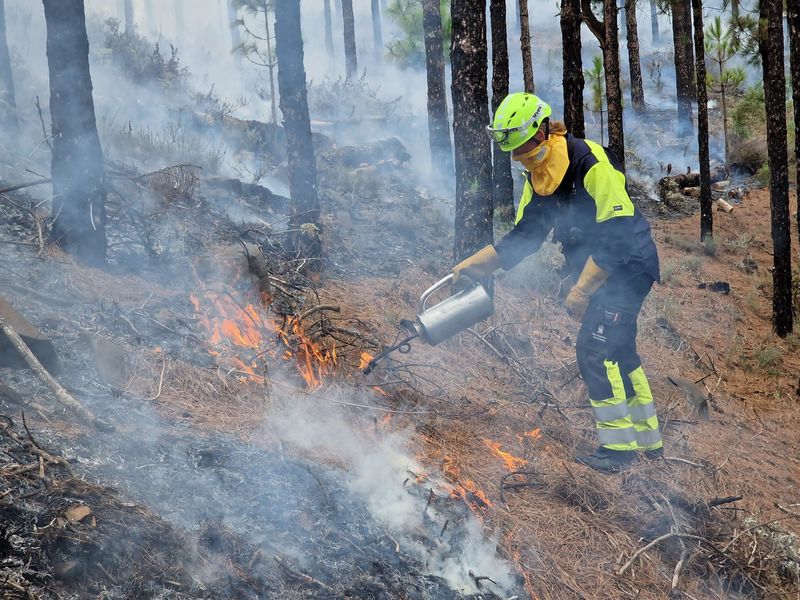The Pau Costa Foundation together with Forest Europe, the European Forest Institute (EFI), and the Forest Science and Technology Centre of Catalonia (CTFC), organized a workshop (“Communicating the important role of Sustainable Forest Management to prevent wildfires”) in Barcelona, from February 7th to 9th, with foresters, researchers, communicators, journalists, and policymakers from different regions of Europe. The main objective was to share the growing challenges for forest managers to prevent wildfires, as well as to discuss the role of communication and media in reporting on these events, their consequences, but also the practices that are carried out to generate more resilient forests.

The first day started with a field trip to one of the forest areas in the Montserrat mountain, a peri-urban forest area, historically characterized by drastic changes in the population density, and the subsequent wildfires that have affected part of its forest cover in the last 30 years. On this tour, prepared by CTFC ,Pau Costa Foundation and the Diputació de Barcelona and hosted by El Bruc council, participants were able to discover plots with fuel treatments carried out on-site such as strategic forest management, prescribed burns, and extensive livestock. These actions are carried out with the aim of better managing the wildland-urban interface and discovering new and innovative measures for wildfire risk disaster reduction. The field trip counted also with speakers from several entities working in the Montserrat area: Montserrat Natural Park, the Catalan Fire and Rescue Service, La Pedrera Foundation and the Association of Forests Owners of Montserrat Surroundings.

The second day took place at Sant Pau Hospital premises in Barcelona. In the morning session, CTFC led the first session, “Understanding the wildfire risk management cycle and its communication” with and interactive activity to spot communication challenges and solutions in the field of wildfires. The session also included presentations from Pau Costa Foundation on how to explain wildfires to children through the Foundation’s environmental education programme “MeFiTu”; from the Programme for the Endorsement of Forest Certification (PECF) and from the Department of Climate Action, Food and Rural Agenda and the Catalan Fire Service and Rescue on communicating prevention activities and during an emergency. Both talks and the interactive activity covered topics such as basic pedagogy on forest management concepts for children at primary school level, differentiated communication strategies between the forest sector and society, and the relationship between journalists and the media with fire response entities.

The afternoon´s session dealt with understanding and communicating the importance of wildfire risk prevention building on the role of sustainable forest management and other concepts. On this occasion, FOREST EUROPE presented its work related to the pilot of the pan-European Forest Risk Knowledge Mechanism that seeks to collect proven best practices for risk reduction of different hazards for forest areas such as fires but also disturbances, pests, and storms, among others. In addition, Alexander Held, researcher and expert in wildfire management, shared diverse experiences and cases where everything is related, and stated that it is important that local rural communities play a key role in landscape fire management because national authorities cannot be omnipresent and are not always capable to conduct all necessary activities in wildfire prevention. As a result, local fire management committees must be set up to play an active role.
One of the communication tools shown as an example of good practice to get different stakeholders to inform themselves and then take action is the policy brief (“Reducing Wildfire Risk in Europe through Sustainable Forest Managemant”) by Forest Europe and EFI. Moreover, Isabeau Ottelini, a PhD student from the Innovative Training Network PyroLife, presented her research on wildfire communication done by the community-based initative Pego Viu, and defended communities are agents of change.

On the last day the focus was on the debate and pitching of ideas created by groups of participants, intentionally mixed between researchers, communication managers, and forest experts to convey the audience of economically viable and sustainable strategies to communicate and promote sustainable forest management activities in different regions of Europe. The aim was to make the attendees understand the challenge of not only the science-media relationship but also the balance between prevention efforts and the human and economic efforts involved in reacting to wildfires in dry and extremely hot weather seasons.






